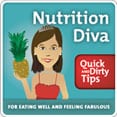The Managing Editor of ABC News Medical Unit emailed me yesterday, asking for help understanding a new study on high protein diets. In the study, the researchers put people on high-calorie diets ranging from 5 to 25% protein. They expected to find that the people on the high-protein diets would gain less fat. In fact, all three groups gained the same amount of fat. But the researchers were also surprised to find that those on the low-protein diet gained less weight.
“I am having trouble figuring out if low protein is a good thing thing or a bad thing according to this study,” he wrote. “Isn’t it good that it lead to [less weight gain] than high protein? I am not sure what message there is for the public.”
Here’s my answer:
First, remember this study involved purposely over-feeding people in order to make them gain weight, so it’s not directly relevant to people who are restricting calories in order to lose or maintain their weight. (And, as an aside, people who eat more protein often end up eating fewer calories because protein tends to be more satiating.)
See also: How to Eat Less Without Feeling Hungry
Secondly, the subjects all gained similar amounts of body fat, which is exactly what you would expect when people eat more calories than they burn..the excess is stored as fat.
The key finding in my mind is that the people on the higher protein diet gained lean muscle tissue (in addition to fat) and the people on the lower protein diet lost lean muscle tissue. That explains why the high protein group gained more weight. But it does not mean that they ended up worse off. In fact, you could argue that the increase in muscle tissue (and the corresponding increase in metabolism) in the high protein group partially offsets the negative impact of the fat gain.
As I commented to Roger, I think there are two take-home messages for the public, neither of which is particularly new:
1. Too many calories will lead to an increase in stored fat, no matter what the source of those calories.
2. Higher-protein diets appear to promote (or at least preserve) lean muscle tissue and that’s generally a good thing.
And one important take-home message for the scientific community.
3. BMI (weight) doesn’t tell the whole story. When evaluating the effects of different diets on health, you need to take body composition (percentages of body fat and lean muscle) into consideration as well. In this study, if you only looked at the change in BMI, you’d conclude that the high-protein diet did more damage than the low-protein diet. But when you look at the changes in lean body tissue and fat, it appears to be just the opposite. If I weigh more but have less fat and more muscle, I’m probably better off than someone who weighs less but has more fat.
Related content: How Much Protein Should You Eat?




